 |
South Africa (part 1) 1900-1920 material & Bayonet types |
2000-... |
1920 -1990 |
 |
South Africa (part 1) 1900-1920 material & Bayonet types |
2000-... |
1920 -1990 |
| The three-pin wooden plugs and sockets
shown below were installed in the southern suburbs of Cape Town,
served by the "Cape Peninsula Lighting Company", established in 1900 -
taking over the first public lighting undertaking established in 1893.
CPLC used alternating current from the start, unlike the central city
which provided DC supply right up to the 1920s. The earliest date for those wooden plugs is 1900, they would have been most common before the first World War, and the latest date they may have been installed was 1920, In the 1920s British standards (BS 73 → BS 372 → BS 546) for plugs was mandated for the whole of South Africa. See next page for BS 372 Part I (2-pin) and Part II (3-pin) and BS 546 material. |
 |
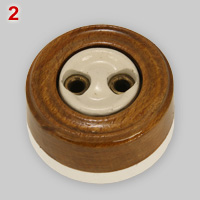 |
 |
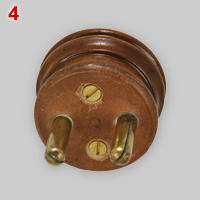 |
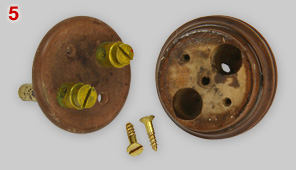 |
1-5 |
Wooden 'Union' socket and plug. The Union type was rated at 10A, but could handle 15A. It was the precursor of 15A BS 73:1915. The porcelain body of the socket carries number 966, but does not show the name of the manufacturer. {PC} Pin dimensions are: length: 20 mm; diameter: 6.0 mm. Pin spacing: 19.2 mm. |
 |
 |
 |
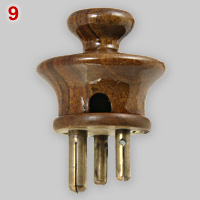 |
| 6 - 9 |
Wooden, 3-pin socket and plug. The porcelain socket body is
British made, shows an Ensign label (see also image 15), and has
the numbers 1257 / 1248. Dimensions: power pins are 19 mm long and have a diameter of 5.6 mm; earth pin is 22 mm long and has a diameter of 7.0 mm. Power pin spacing and earth pin offset are given in image no. 8. Pin configuration resembles to 5A BS 546, but critical differences are a ca. 6 mm smaller earth pin offset, and a 0.5 mm larger power pin diameter. {PC} |
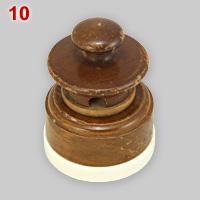 |
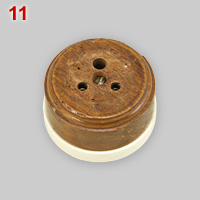 |
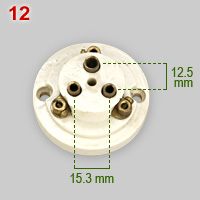 |
 |
 |
 |
10 - 15 Wooden / vitreous (porcelain) 3-pin plug and socket. British manufacture by General Accessories Co Ltd, Bristol (see image no. 15 with GAC logo). Power pin lengths: 15.5 mm; diameter: 3.6 mm. Earth pin: length: 16.5 mm; diameter: 5.0 mm. Pin dimensions indicate that plug and socket are 2 or 3 Amp. models. The plug closely resembles BS 546 2A plugs, but a small difference in power pin spacing is responsible for incompatibility with 2A BS 546 sockets. {PC} |
| Bayonet sockets are still the most common
type of lamp fitting in South Africa, but manufacturers are promoting a
change to E26 Edison screw lamp sockets. In former days, rooms in more
simple accommodations had only one BC (Bayonet Cap) light socket.
Electrical
appliances had to be connected to the BC socket by means of a bayonet
plug. Find more examples of bayonet cap material on the BS 52 page. |
 |
 |
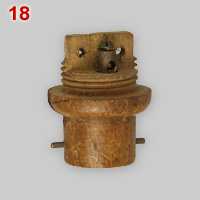 |
|
| 16 - 18 | Wooden
plug that can be connected to a BC or B22d-2 lamp socket. B = bayonet;
22d = diameter in mm; 2 = 2-pin. The plug has been used in South Africa. Rating, age and name of manufacturer are unknown. {PC} |
 |
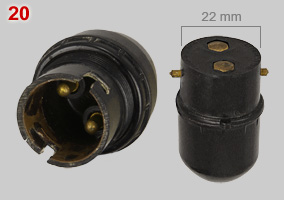 |
 |
| 19 - 21 | South African made, Litemaster B22d-2 lamp fitting and plug; attached (no. 19) and separate (no. 20). Image no 21 shows a Litemaster bayonet two way adapter that allows simultaneous use of a lamp and electrical appliance. {PC} |
 |
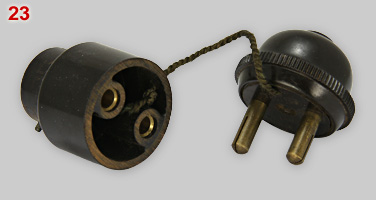 |
|
| 22, 23 | A British made, by Goltone, B22d-2 plug that consists of two components: a 2-pin connector and matching plug. The connector complies with BS 52 (bayonet end) and BS 372 (outlet end). The plug complies with BS 372 Part I (5A). {PC} |
 |
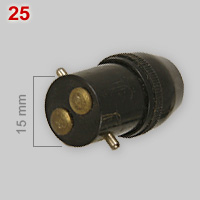 |
|
|
| 24, 25 | SBC15d-2 lamp socket and matching plug. SBC15d is a smaller version of BC22d (15 mm versus 22 mm). Images 19-20 and 24-25 have the same rate of magnification. The lamp socket carries no. 1241, but no rating or brand name. {PC} |
| Each of the items on this page have been donated by Peter Coates {PC}. |
2000-... |
D i g i t a l M u s e u m o f | |
P l u g s a n d S o c k e t s | 1920 -1990 |